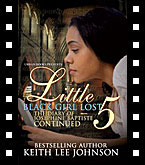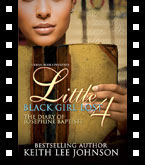
Keith´s Interviews
Ann Coulter


Jada Pinkett-Smith

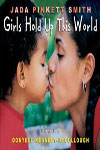
Wicked Wisdom

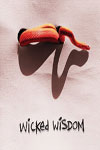
Phillip Thomas Duck
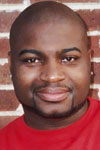

Alisha Yvonne


Laura Schlessinger


Dr. Frederick K.C. Price
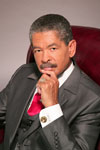

James Patterson


Eric Jerome Dickey
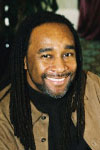

Jackie Collins


L.A. Banks
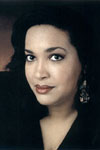

Brandon Massey


Kendra Norman-Bellamy


2006 interview with author Phillip Thomas Duck
2005 Interview with author Phillip Thomas Duck

Keith Lee Johnson: yes, sir.
Phillip Thomas Duck: I'm ready if you are...I'm just gonna freestyle it.
Keith Lee Johnson: Ready, brotha. Shoot!
Phillip Thomas Duck: Okay. I'm going to refer back to an earlier interview we did at times. I think it's interesting to see the evolution of a person's thoughts and experiences. Okay?
Keith Lee Johnson: ok
Phillip Thomas Duck: To start off. Happy Holidays to you. For our readers, we just celebrated Christmas yesterday. Christmas means faith, celebration, and Jesus to me, what does it mean to you Keith?
Keith Lee Johnson: Let me be very frank here. I don't like what Christmas has become. It is no longer about Christ, and I don't remember when it was. But for me, it is a time to remember that God sent his Son in the form of man to save the world from sin.
Phillip Thomas Duck: I agree with you wholeheartedly. It's so commercial, gifts, gifts, gifts. I took great pride in my daughter singing Happy Birthday, Jesus yesterday. I took pride in family gathering and showing one another love, too. Your faith is pretty strong. Did you do anything in particular in reverence yesterday?
Keith Lee Johnson: I don't know that going to church on Christmas is particularly reverential, but that is what I did in addition to prayer, thanking God for all that he has done and all that he's going to do in 2006.
Phillip Thomas Duck: That's great. And 2005 was a good year for you wasn't it?
Keith Lee Johnson: Yes it was for the most part.
Phillip Thomas Duck: Now, I was in the spirit yesterday, as you were as well. And I'm a big basketball fan so of course I watched the Kobe-Shaq game. I was struck by the severity of the feud between those two. They wouldn't even acknowledge one another, despite being former teammates, despite winning three championships together. This all got me thinking about a subject we've discussed ad nauseum. The competitiveness and hostilities in the publishing industry. Do you see any change in this aspect of the business?
Keith Lee Johnson: No, sir. For the most part, no. On the other hand, it isn't all bad. Carl Weber has treated me extremely well and it is my hope that in the next three years, it will get even better between he and I.
Phillip Thomas Duck: You mentioned the strength of that relationship in the last interview. Carl Weber is publisher of Urban Books for those who don't know. Expand on what he has meant to your career and your hopes on what the future holds.
Keith Lee Johnson: Well, I met Carl back in the summer of 2001 at a Sadorian Publications event. I was very impressed with him, just as I was impressed with last month's interviewee, Ms. Tracy Price Thompson, who was also at the event, along with Tee C. Royal, and a host of other people I'm happy to say I met. To make a long story short, Carl Weber talks a good game, but he backs it up with his actions and the sales of Little Black Girl Lost speaks very loudly to this issue. He has kept his word to me on more than one occasion and since you know me personally, you know very well that the keeping of one's word is paramount to me. So, when it comes to the publishing biz, at this point, unless he's fooled me, which has happened before in the biz, I think everything will be all right with this man.
Phillip Thomas Duck: I think so, too. From the outside looking in, I think he just understands his business. So, I'd like you to play Carl Weber for a moment and answer some questions he had to answer when it came to your books. Who is Keith Lee Johnson's audience? In what ways have you attempted to reach them? And in what ways would you LIKE to attempt to reach them, but haven't as of yet?
Keith Lee Johnson: For the Little Black Girl Lost series, Weber has been reaching out to Black women, but my audience is far more diverse than that because I write in more than one genre. How he's reached said black women has been through Vibe ads and street vendors. He's also hired Peggy Hicks, who I'm told is a heavy weight in the biz in terms of publicity. All of these combined has catapulted me to new heights and I'm expecting to make quantum leaps in 2006 because of his efforts and what I believe God is going to do too.
Phillip Thomas Duck: You said your audience was much more diverse than just black women. So what, your books are for more than just "Laquisha and dem"?
Keith Lee Johnson: LOL! Most definitely. I get emails from all backgrounds it seems. Now men are starting to read my work and that is saying something. For example, a Minister here in Toledo heard about my work through his barber, who happens to be a black woman. She told him about Fate's Redemption, which she loved, and went to Borders, bought it, and read in a couple of days and then ripped into PRETENSES & Little Black Girl Lost. The Minister loved them all and picked up many of the spiritual lessons in the novels that many of my fans miss. He even went as far as purchasing 21 books for friends and relatives. He called friends in Wichita, Pennsylvania, and various parts of Ohio. As you know, my friend, I wrote PRETENSES for Jada Pinkett and the Minister knows her Pastor personally. He promised to call said pastor and get PRETENSES and Sugar & Spice in Jada's hands.
Phillip Thomas Duck: That would be wonderful. The Phoenix Perry character is a great example of a black female hero, and should be on the screen. I was struck though, that you said many of your fans missed the spiritual messages in your books. How do you feel about that?
Keith Lee Johnson: It's bothersome, but at the same time, they don't buy the books for those lessons.
Phillip Thomas Duck: So why include them? In hopes that they might catch a lesson?
Keith Lee Johnson: Our people are in trouble. It is my hope that while they are being entertained that something would get through to them and perhaps make them think. For example, Johnnie, in Little Black Girl Lost, is a born again Christian who was sold into a form of bondage. Her mother wanted to get paid, but God wanted her to learn something else.
Phillip Thomas Duck: KRS-One, the rapper, called his music EDUTAINMENT because it combined entertainment and education. Is that an apt term for Keith Lee Johnson's work? And if so, why was that an important aspect of the writing, to you, when you sat down to first write novels?
Keith Lee Johnson: I would not call it edutainment, but others have dubbed it as such. It's important to me because not only is the black community in trouble, America itself is in trouble. Our enemies call American women whores with conviction and they don't respect American men. Perhaps that's why they were bold enough to take those planes on September 11 without guns. Perhaps I watch too many films. But I don't think any one can deny the serious decline in morality in America and this immorality has, to some degree, empowered our enemies, who now believe that Rome (America) is ready to fall yet again. I don't know that I personally can argue with any of their assumptions about us as a nation. Can you?
Phillip Thomas Duck: I can't. Like you say, so much is troubling. I think African American fiction is troubling, myself. Name your book, "Desperate Crack Ho's" or "Thug Niggas Don't Ever Cry, Bitch" and you got yourself a bestseller. What do you think about this phenomenon in Black publishing?
Keith Lee Johnson: First off, let me say that if people are willing to pay for it, publishers will publish it. Having said that, I'll add that I don't see any longevity in it, much like the Black films of the 70s, the Harlem Renaissance, and the black books of the 70's written by Iceberg Slim and Donald Goines. All of it went away, but what always remains and will remain, I'm certain, is literature and Cinema. This is why it is imperative to be able to do more than one thing in this biz because when it all comes crashing down, literature will remain. Of this I'm sure.
Phillip Thomas Duck: You telling me "Desperate Crack Ho's" isn't gonna be required reading in high schools in the future? LOL!
Keith Lee Johnson: LOL!
Phillip Thomas Duck: We're talking about literature; let's speak on Fate's Redemption. You were on the eve of its release in our last interview. You admitted the novel dealt with some controversial issues, most notably interracial dating. You were nervous about the response the novel would receive. How has the response been?
Keith Lee Johnson: For the most part, the response by both blacks and whites has been remarkably accepting. That surprises me because Fate's Redemption, unlike my other novels, is far from subtle. It is coming right at you and you can't get out of the way. Once you read it, you have to deal with you, not your neighbor, you.
Phillip Thomas Duck: Some hard truths in it? Tell me one.
Keith Lee Johnson: Okay and this is the least of them, brotha. The main character, Will, is being picked up from the airport by his best friend. His friend is complaining about the white man and how the white man is keeping him down. He wants Will, who is seriously paid, to go in on a business venture with him. When Will says, "Cleve, I'll tell you what. Go back to school, take some business courses and I'll go in with you." In other words, he was going to bankroll the whole thing with his own dough, right? To this amazing gesture, Cleve says, "I'll think about it." This brotha wouldn't lift a finger to help him self, yet he's blaming the white man for his problems. Further, I point out that this same white man gave Will the loans to get his thriving business off the ground. This scenario is all too familiar in the black community. If it's easy, I'm down wit' it bruh. If it's hard, you can count me out. And that is one reason we as a community are in serious trouble.
Phillip Thomas Duck: I was going to hit you up for a loan to start a chitlin and waffles franchise but I see you'd make me work, so I won't bother. lol. No, seriously, it's sad isn't it?
Keith Lee Johnson: What's worse, Philly Phil is that, when someone like myself, who isn't afraid to tell these Negroes about themselves, suddenly I'm considered an Uncle Tom. What I find particularly funny about that is these Negroes don't even know what an Uncle Tom is. If they did, they wouldn't use the term so loosely.
Phillip Thomas Duck: Negroes isn't politically correct, Keith? LOL.
Keith Lee Johnson: Yes, I know, but neither am I.
Phillip Thomas Duck: No, you ain't. lol. I remember another topic you broached in Fate's Redemption was the double standard with interracial dating. Diana Ross could bed and wed as many white men as her soul desired, but the Terrence Howard's and Charles Barkleys catch flak, are vilified, for dating and marrying white women. Did you get any reader response on that topic? Do you still feel this way?
Keith Lee Johnson: Actually, the responses I get are all good. Even the one bad review at Black Expression wasn't a total loss. The woman didn't like the book, but all the rest did. As for the double standard, yes, it still exists, but a number of black women have written me, saying they are now rethinking the whole matter. I'm proud of that.
Phillip Thomas Duck: You changed some viewpoints?
Keith Lee Johnson: I think so, yes. As you know, the interracial thing is huge for black women and for so many to write and say what they said, I'm quite flattered. Now, having said that, most that write have dated white men themselves, or so they said. LOL!
Phillip Thomas Duck: LOL! I think of your work as being very flattering to the Black woman, so I can understand their support. Phoenix Perry, who we mentioned earlier, is a strong Black woman, a hero of sorts. What is her future? Any more Phoenix Perry novels coming down the pike?
Keith Lee Johnson: Well, there is at least one more. Scarecrow is the title, but Carl Weber doesn't like the title. So they will probably change it to something else, which is okay, I guess, if it increases sales. If it doesn't, I'm not happy because there is a reason for all my titles. I don't just grab something out of the air.
Phillip Thomas Duck: So it won't be released through the publisher of the previous Phoenix Perry novels, Strebor?
Keith Lee Johnson: No, sir.
Phillip Thomas Duck: How do you feel the series will do at a new publishing house? Are you confident in its prospects? I know you love writing the thrillers more than anything else.
Keith Lee Johnson: I'm confident, but not because of the publisher. Carl has told me he's not sure if he can increase the sales either. The thing is, I believe he'll do what he can to increase sales and that's all I can ask for. On the real side of things, I think people will pick it up because they are familiar with my writing and because of what Weber is doing.
Phillip Thomas Duck: I assume the Phoenix Perry book is some time away from release. You do have Little Black Girl Lost 2 coming out in early '06 though. The further adventures of Johnnie Wise. Talk about this release.
Keith Lee Johnson: Little Black Girl Lost 2 will be officially released Feb 1, 2006, but some stores will have it in January. This novel continues where the first one left off. It answers many of the questions readers wanted to know like what happen with Johnnie and Lucas. It deals with Napoleon's situation with the Mafia and much, much more. My Tour is kicking off in the Baltimore Washington area beginning January 20-22. I'm looking forward to this.
Phillip Thomas Duck: Sounds great. What else can we expect from Keith Lee Johnson in the near future?
Keith Lee Johnson: Besides Scarecrow, which as we mentioned earlier, is a Phoenix Perry novel, there is also a book I expanded from a short story titled: Man & Wife. I wrote that one in less than 30 days, I think. It's about a hard working man who gets a call from his girlfriend to break off their relationship. I wrote the short about two years ago at the behest of one Michael T. Owens, an author who was putting together an anthology at the time.
Phillip Thomas Duck: You sound prolific. What are your thoughts on writers actually writing, many don't. You believe in writer's block?
Keith Lee Johnson: Well, sir, I can't help but believe in it because authors say they have it from time to time. I personally have not experienced it and hopefully I never ever will.
Phillip Thomas Duck: I haven't experienced it, either. I've had days I didn't want to write, and didn't, but no writer's block. I consider it a lack of discipline or preparation instead of block. I could be wrong. Moving on. In our earlier interview I deemed you a courageous writer. I asked if there was any subject you considered too taboo, too touchy. One that you'd shy away from writing about. You said, no, not if it interested you. Stand by that?
Keith Lee Johnson: Yes, I stand by that.
Phillip Thomas Duck: Nothing Keith Lee Johnson fears?
Keith Lee Johnson: I'm not sure what you mean. Give me a bit more detail on the question and perhaps I can answer properly.
Phillip Thomas Duck: Any taboo topics in your head, percolating, that you're thinking about exploring? You tackled child prostitution, interracial dating etc...
Keith Lee Johnson: No, because none of the stories are taboo to me. All things have been written about long before I was on the planet. Therefore, the subject matter I write about is already out there. I'm just coming at it from a different perspective perhaps.
Phillip Thomas Duck: Well, that's a good thought. I look forward to what else your mind has to delve into. Aiight, we're in the homestretch. You can't bring two intelligent Black men together without talking sports and politics. Two things are on my mind. I wish we had beer and chicken wangs (yes, I said wangs) for this brief discussion but since we don't let's hit my two things. Okay?
Keith Lee Johnson: Okay.
Phillip Thomas Duck: Are you familiar with the NBA's new dress policy that forbid the players from wearing what I'll term hip-hop clothing (throwback jerseys, baggy jeans, bling bling jewelry)?
Keith Lee Johnson: To a small degree, yes.
Phillip Thomas Duck: Well, many of the players cried RACISM because this is clothing favored primarily by Black males. Do you think the players were right? Was the NBA justified?
Keith Lee Johnson: Was it racism? Hmmm, I'd have to say no, sir. Management has a right to dictate attire for their employees. This is nothing new. Further, the NBA Players Association sanctioned this change. To my knowledge, the NBA is like what? 90% brothas? So are the brothas racist for agreeing to this? As for the NBA being justified, they don't have to justify anything. For example, let's say I'm running a Fortune 500 Company. Guess what? You can best believe I will have a dress code and a hair code and a tattoo code and a piercing code to boot. I'm running a business here. Get with the program or find somewhere else to work. This is business, not a playground.
Phillip Thomas Duck: I agree about the business angle, and the fact that Fortune 500 companies will dictate dress. My problem was the fact that the NBA on one hand targets the hip hop audience. Rap music blasting in the arenas, sponsors who use their players in ads with a hip hop vibe. And the players to me are entertainers and their dress reflects this. Was it racist? I don't believe so. I do believe the NBA was hypocritical with the decision though. And in large part it was because of the public outrage over the brawl.
Keith Lee Johnson: Hypocrisy can be found anywhere you look, my brotha. Anywhere you look. The bottom line is, they can do what they did. But on the real side of things, let me drop this knowledge on the readers. This is the truth as I see it. David Stern realized that the NBA's audience was predominately white. Brothas was scaring white folks and David said, "Uh, we don't want to scare our goose that lays the golden eggs." And I don't blame him one bit. For what the players are getting paid, and I personally have no problem with athlete's salaries, they should comply with little to no resistance. If necessary, they can change the hip hop music and culture if they like so that the hypocrisy, as you call it, will discontinue.
Phillip Thomas Duck: Would a Black Commissioner have come to the same conclusion?
Keith Lee Johnson: If he's worth his salt, yes. Why? Because the customer is always right! This is the law!
Phillip Thomas Duck: No subtle racism in the move?
Keith Lee Johnson: Perhaps, but so what! In business, in this particular case, it's about the money. The brothas had that brawl last year, which I believe started this in the first place. I'll go a step further and add that if the brothas had just beat up each other and not the white fans, they would still be able to where their hip hop clothes. But as you know, we can't have millionaire brothas whipping white folk on television. This is a no no. Whip each other and that's cool. And therein lay the problem. Had the commissioner stopped the brothas from whipping each other, they never would have whipped their white fans and you and I would not be having this discussion now. Black on black crime is still acceptable in all venues.
Phillip Thomas Duck: Soon as I saw Ron Artest swing at that white fan, I thought, damn, the shit is about to hit the proverbial fan.
Keith Lee Johnson: LOL!
Phillip Thomas Duck: I was praying they'd mistake the fan for a light skinned Black, for Artest's sake.
Keith Lee Johnson: LOL!
Phillip Thomas Duck: Aiight. Is T.O. (Terrell Owens) an out of control Negro (your word...lol)?
Keith Lee Johnson: I think Terrell Owens needs people around him who aren't afraid to pop him in the mouth figuratively and literally. He needs someone who really cares about him to go a few rounds with him. And after the verbal butt whipping, perhaps a literal butt whipping will wake him up. He's lost a bundle dealing with whoever he's listening to. This is money he probably won't get back. It's up to him to get some better people around him.
Phillip Thomas Duck: Is he at all misunderstood, as he's claimed?
Keith Lee Johnson: Yes, I'm sure he is. But at the same time, SHUT UP THEN! He's supplying the bullets they shoot him with.
Phillip Thomas Duck: I can't fault his criticism of quarterback Donovan McNabb. I had McNabb on my fantasy football team and Donovan bent me over and had his way with me. It was a tough season. lol
Keith Lee Johnson: LOL! I was going to mention your rapid decline in the league! LOL! As I told you when you were running your mouth, "It's a long season."
Phillip Thomas Duck: Long ain't the word. :)
Keith Lee Johnson: LOL!
Phillip Thomas Duck: Anyway, I think TO's problems mirror the problem with the black community. We're in trouble and we don't [have] enough folks standing up and giving us hard truths about ourselves. That's why Fate's Redemption is to be commended. Now, a serious political note...
Keith Lee Johnson: Thank you, sir.
Phillip Thomas Duck: No problem.
Phillip Thomas Duck: What did you think of Tookie Williams's execution and the uproar in the black community over it?
Keith Lee Johnson: I think too many Negroes will go to the mat for a man that, even if he didn't kill the four that he was convicted of killing, is responsible for far more than the four. Yes, he wrote some books. Yes, he was nominated for the Nobel Peace Prize. I say give every brotha on lock down paper and pen or a laptop, particularly those who don't belong there in the first place. Perhaps our black shining stars could look into the cases of brothas who haven't killed anyone or done anything close to what Mr. Williams acknowledges of his checkered past. My question is this: When will our people learn not to coddle the criminal element that eats at our very flesh? When? If anyone was where he belonged, Mr. Williams was. The organization that Mr. Williams helped bring into existence is the same criminal organization that helped create Crack addicted mothers that will suck off any man willing to pay her price to acquire the very substance that has her on her knees, sucking off men in the first place. This criminal organization, more often than not, willfully, blindly, lines its pockets, and builds its reputation by destroying who? Black folk, that's who; and they will continue this self-destructive behavior long after Mr. Williams meets with God and tells him about the books he's written, and the Nobel Peace Prize he was nominated for. Perhaps those two laudable achievements will be enough to get him through the pearly gates.
Phillip Thomas Duck: Did he redeem himself?
Keith Lee Johnson: His Redemption is between him and God. The consequences of his actions were to be paid for on earth. Just as those who seek sexual gratification without protection, and the baby that comes along in 9 months, well you get what you wanted, even though you didn't want it. Much of what happens to us is because of our own doing. If you want a good life, don't break the law, don't bang Suzy cuz she gon' get pregnant, and it's gon' be yo' baby, and yo' options will be seriously limited.
Phillip Thomas Duck: I can't disagree with you. I'd prefer we had no death penalty. And I want to believe Mr. Williams was sincere in his heart, had in fact turned to a greater level of consciousness. But, as you do, I can't ignore the coldhearted terror the Crips have put on countless Black communities throughout our nation. That said, I'd hoped he wouldn't be put to death.
Keith Lee Johnson: I have no problem with it. In fact, it shouldn't take 26 years.
Phillip Thomas Duck: A long limbo, for sure.
Phillip Thomas Duck: Well, Cool Keith, last question.... I've read many interviews where they ask the question of what fans etc don't know about the interview subject. I'm gonna flip that. What is one thing your fans, writing peers etc. are SURE they know about Keith Lee Johnson that is absolutely false?
Keith Lee Johnson: They all probably think I love books and I don't. I love film. That's my passion.
Phillip Thomas Duck: Hmmm... interesting. Well let's hope Phoenix Perry makes it to the screen with Jada in the role. It's been a pleasure, Keith. Looking forward to Little Black Girl Lost 2. Continued blessings to you and your pen.
Keith Lee Johnson: Thank you, sir for another probative interview, probably the best one I've ever had. For real tho'! LOL! I'll call you in a minute for the follow up.
![]()

THE ROCK: Who is Keith Lee Johnson, tell us something about you?
Johnson: I was born and reared in a Toledo, Ohio ghetto. When I think back on it, school was only fun, in terms of learning, in first grade. I was the teacher's pet. She made me feel special and I actually tried to learn a thing or two. However, from second grade forward, school was a necessary evil. No one took interest in me. I'm not sure anyone cared if I learned or not. So neither did I. Fortunately, my mind was sharp and I managed to pass tests and get promoted every year without spending a lot of precious time studying. There were girls to pursue, ya know? By my junior year, I decided to try writing a serious composition paper. I'll go into detail about that later as I see question 4 would be the more appropriate place to discuss what happened. Anyway, girls became more important than school, friends, and any career I should have been preparing for. This preoccupation with the opposite sex nearly ruined my life in terms of ever having any real direction. Like a man said, "I was blind, but now I see."
THE ROCK: Where are you from, and currently residing?
Johnson: I still live in Toledo, Ohio, but on the other side of town. LOL!
THE ROCK: Are there any other writers in the family?
Johnson: No, sir.
THE ROCK: When did you start writing?
Johnson: I started writing about 8 years ago in college. But my real introduction was as a junior at Robert S. Rogers High School in 1977, where I was thoroughly ripped to shreds for being brazen enough to turn in a composition that was far from stellar. The teacher cut into me with words so sharp they might as well have been glass. Everyone laughed themselves silly, including the teacher, who was doubled over, but continued to launch his fiery artillery in the form of words. I left the room and never returned. My defeat, as it were, was complete and nearly unredeemable. But there were always girls, right?
THE ROCK: What prepared you to become an author?
Johnson: Life itself prepared me for authorship. All my experiences, here in the Western Hemisphere and abroad. Everything I see, everyone one I meet, every conversation I overhear, every news article or news event continues to prepare me. Wisdom and foolishness, ups and downs, triumphant and defeat; all of these shape the worlds I create.
THE ROCK: What inspired you to become a writer?
Johnson: A teacher named Leonard Kress. As irony would have it, both men were white. What one man broke, another man mended. There is a God, is there not?
THE ROCK: What inspired you to write your book?
Johnson: My books are inspired by the human condition, the messes we make of our lives, the decisions we make on a daily basis, and what we allow others to get away with. Being the author of Suspense/Thrillers such as Pretenses and Sugar & Spice and dramas like Fate's Redemption and Little Black Girl Lost, all deal with themes that push the envelop. And in so doing, deliver inspirational messages, albeit subtle, along with the entertainment one expects when purchasing novels.
THE ROCK: Tell us about your newest creation. What is the premise?
Johnson: My newest novel, Fate's Redemption, deals with the lives of three brothers; Jericho, the drug and munitions dealer with CIA connections; Sterling, the attorney and philanderer, and William, the psychologist. It is about the decisions they make and the consequences of those decisions. It is soul stirring, introspective, and philosophically penetrating. It is revealing in that it forces one to question ideology long held as the supreme truth, shatters this truth, thereby making room for a new truth and new ideology that could be superior to those truths once held dear. Fate's Redemption is by far my most controversial book, which boldly delves into race, drugs, the CIA, and many other themes.
THE ROCK: Any publishing contracts in the working?
Johnson: I'm fortunate in that I have contracts with both Strebor Books International, owned by best selling author, Zane. And Urban Books, owned by best selling author Carl Weber.
THE ROCK: Have you ever self-published? Why or why not?
Johnson: No, I never self-published because I never had to.
THE ROCK: What are "traditional publishers" looking for?
Johnson: Traditional publishers are looking for manuscripts that are not only well written, but have a high commercial appeal. In other words, they are looking for novels that have high earning potential. And it's cool with me because we're all trying to make a living. Everything is about money, eventually, if you look hard enough.
THE ROCK: If you were a publisher, what would be your niche? Why?
Johnson: If I were a publisher, I wouldn't have a niche, per se. Again, it's about the money. Let me explain as I know people may be trippin' on this truth. It costs to produce books, okay? Therefore, it only makes sense to publish novels that bring money to stockholders, as this is why they invested in my company. While that may sound like unabashed greed, it isn't. It's business period. And to be perfectly frank, if my novels don't start selling soon, guess what? Publishers will no longer be interested in publishing my work. I have no problem with this because it's business. Either produce or ya gotta go. LOL!
THE ROCK: For an author, is having a publishing contract with a "traditional publisher" important professionally? Why?
Johnson: Having a contract with a traditional publisher makes the author legit out the gate. However, a street savvy self-published hustler will probably sell more books faster than the authors who have traditional publishers doing everything for them and thus get their attention.
THE ROCK: What are some of your professional and personal achievements?
Johnson: One of my professional achievements was becoming a highly valued member of the United States Air Force and serving this great nation. As for personal achievements, well, I think writing 4 books are a real landmark for me, considering my junior year of high school.
THE ROCK: Who are some of your favorite authors?
Johnson: Two of my favorite authors are Eric Jerome Dickey and Jackie Collins. Both keep it real and both authors are hilarious. Nevertheless, I prefer non fiction, particularly Mafia non fiction about real gangsters like Al Capone, Sam Giancana, et cetera.
THE ROCK: Where do you want to be in 5 years?
Johnson: In 5 years, I want to be on the New York Times Best Sellers List!
THE ROCK: Where can readers find you?
Johnson: Readers can find my books in just about any store in the country and online venders like Amazon, Barnes and Nobles, Books-a-Million, Borders, Waldens, and Walmart. Readers can also visit my website at www.keithleejohnson.com. They can also checkout my articles at http://www.undressingthecrowd.blogspot.com.
THE ROCK: Thank you, Mr. Johnson.
Johnson: Thanks for having me ROCK. Peace!
![]()
Thank you
Keith
for sharing information with readers!
-The SCBC, Inc.
Where are you from?
I was born and raised in Toledo, Ohio.
Tell us your latest news?
My latest news is the imminent release of PRETENSES, my much anticipated novel about an extraordinary assassin named Coco Nimburu.
When and why did you begin writing? What inspired you to pen your first novel?
Actually my introduction to fiction writing came by accident. I was going to school to study psychology. I happened to be taking a literature course and a fiction course in the same semester. My fiction teacher encouraged me to continue a short story I was writing in my literature class and it became a 579-page novel. It was then that I realized I had something, but I wasn't sure I could do it again. To me, one book doesn't make you a writer. A true writer can write book after book.
Who or what has influenced your writing, and in what way?
My writing and my life is influenced by three self-made men; Philosopher, actor, and martial artist, Bruce Lee; Fiery, self-taught, revolutionary, Malcolm X; Civil Rights Leader, Dr. Martin Luther King Jr. In each book I've written to date, readers sample the meal they served.
Do you have a specific writing style?
I don't know that I have a specific writing style as I am a seat of the pants writer. In other words, I tend to make it up as I go along. It's so much more fun for me that way. So, basically, I let the characters reveal themselves to me, which keeps it interesting.
What genre are you most comfortable writing?
So far I've written dramas and thrillers. I am comfortable with both. But, if I had to pick one and stick with it, I would choose the thriller because there are so many stories to tell. For example, I could writer Legal thrillers, FBI thrillers, Military thrillers, Political thrillers, et cetera. Dramas, on the other hand, will basically deal with relationships.
How did you come up with the title for your book(s)?
The idea came to me spontaneously at Union Station in Washington, DC, while I was waiting for Steven Spielberg's AI to begin back in the summer of 2001. At that time, there was a film with the same Sugar & Spice title, which I found intriguing. I took the title and constructed a story that took my breath away!
Is there a message in your novel that you want readers to grasp?
Yes, there are several messages. But the reader has to look beyond the surface to get them. Most of them are too subtle for most readers to get. I would make the messages more obvious if I were writing non-fiction. People want to be entertained by fiction so that's what I do for the most part. And every now and then, I slip something into the reader's subconscious mind.
Are experiences based on someone you know, or events in your life?
SUGAR & SPICE is purely fiction. I have often told new writers to learn how to make stories up before they tell their true life stories so that they know they can actually create a fictional world that has absolutely nothing to do with them or people they know. And in so doing, prolong their careers. I believe that if one can create one fictional world, one can create many. But, if a person tells their true life story and passes it off as fiction, they have not yet learned to create, which is well within their grasp!
What books have most influenced your life?
The Autobiography of Malcolm X. And Alex Haley's Roots.
What are you reading now?
The Devil's Tear Drop, by Jeffery Deaver.
What are your current projects?
PRETENSES will be released in June 2004. This is my favorite Phoenix Perry novel to date, but, I'm working on one titled SCARECROW, which has the potential to surpass PRETENSES. I'm also working on a political thriller titled THE WHIRLWIND. LITTLE GIRL LOST, a drama set in 1952 New Orleans, should be re-released early 2005 by Carl Weber's house, Urban Books.
Do you feel that the boom in AA writers is a fad or another renaissance?
I think the boom in black writers is neither a fad nor a renaissance, but, there is definitely a resurgence. The real question is this: How many published/self-published authors of African descent will be around ten years from now?
What are some of your aspirations as far as the writing profession?
My ultimate goal is to write screenplays as I am an avid movie fan and have been since I was 6 or 7. I used to live right down the street from a theater. I went to the movies every Saturday and stayed all day. I love movies and would like to see one of my books made, and be a major part of the script writing process.
Name one entity that you feel supported you outside of family members.
Hopefully that will happen. There is but one name that comes to mind and that is Tee C. Royal, founder of RAWSISTAZ. Tee C was very instrumental in not only getting me noticed by Zane and Strebor books, but she single handily spread the word about my work to anyone who would listen.
![]()

Keith Lee Johnson: Actually it was the other way around. I wrote the dramas first. The thrillers happened to get published first.
Phillip Thomas Duck: Why do you think that is?
Keith Lee Johnson: Probably because at the time Strebor was looking for thrillers and I happened to have a couple available.
Phillip Thomas Duck: You do prefer writing thrillers, though. Correct?
Keith Lee Johnson: I do.
Phillip Thomas Duck: It's interesting that LBGL has done so well for you. Its been a mainstay on the Black Expressions bestseller list. It has outsold the thrillers. How do you feel, in that, you prefer the thrillers, and that this book has done better?
Keith Lee Johnson: Well, first off, I'm very grateful for any of my books selling period. Second, to have LBGL doing so well, I'm thrilled to say the least. As far as out selling the thrillers, well, they have to find their audience. I'm confident that they will at some point as women who've read LBGL are telling me they love the thrillers too.
Phillip Thomas Duck: So you believe the audience that loves LBGL with also appreciate the thrillers?
Keith Lee Johnson: That's what's happening now. As a matter of fact, the women who've purchased and read the thrillers met me at a Waldens in Dearborn, Michigan. They couldn't wait to get LBGL. And these same women sold the thrillers to women who were there to purchase LBGL. It's amazing.
Phillip Thomas Duck: Publishing is a tricky business. The way to a bestseller is debated and thought on constantly. Why do you think LBGL has hit sales marks you didn't hit with your two previous books?
Keith Lee Johnson: Two words: Carl Weber.
Phillip Thomas Duck: His influence is that strong?
Keith Lee Johnson: Yes. See, when Weber contacted me, he told me he was going to put some serious dollars behind it in terms of advertising. Then he went out there and backed it up. He was able to get LBGL on Black Expressions out the gate. In fact, he told me nearly four months prior to its release it had already been accepted by BE. Weber talks a good game and backs it up with his actions. I have nothing but respect for the man.
Phillip Thomas Duck: It's interesting you say this, because you've published with both Strebor and Urban. You talked about what Weber and Urban brought to the table. Do you think publishing now, and the success of a book, boils down to how well it is marketed?
Keith Lee Johnson: In this case, yes. I can't say that it is the norm. But the bottom line is, marketing is key and most authors are broke. I mean flat out busted. I mean most of us don't have two nickels to rub together. So ads, good ads, key ads, are going to cost serious money. I'll give you an example. I just had my taxes done a week or so ago and it turns out that I spent over $15, 000 on my thrillers in terms of travel, hotels, gas, food, renting cars, et cetera. And neither one hit BE Best Sellers list. I have spent less then $400.00 on LBGL and its #7 on BE List. The difference? Probably the thousands Weber spent in advertising.
Phillip Thomas Duck: Sobering. Which then leads me to your upcoming release, Fate's Redemption, which will be published by Strebor and not Urban. Tell us about the book and also what your expectations are for how it will perform.
Keith Lee Johnson: Fate's Redemption was the first novel I penned. I wrote this one about 8 years or so ago at the prompting of my fiction writing teacher, Leonard Kress. As a matter fact, it was Kress who told me he wanted me to build a relationship between Drs. William Wise and Terry Moretti. He wanted it to be an interracial thing. I rejected it at first, but he talked me into it. However, the book isn't solely about interracial love. It is about unresolved relationships, between fathers and sons. It's about success and failure. It's about drugs and the CIA and much, much more. The story was fun to write, but probably my most controversial piece, and will no doubt solicit many boos from people that are against these relationships. The funny thing is there is an interracial thing in LBGL; never heard a complaint about it; not one. I'm wondering if it's because the woman was black and the man was white. There is a clear double standard about this.
Phillip Thomas Duck: Oh boy. Expound on your thoughts about this interracial dating double standard.
Keith Lee Johnson: Well, Phill, Black women have been in relationships with white men for years, whether that be in the world of entertainment or just a regular Jane. Now, I know a lot of people want to say, well, that was during slave time and the black woman had to submit. Well, I'm not talking about that time in America. I'm referring to centuries after this time was over. There is a litany of black women who have married white men and I list their names in the book. And guess where I got the list from? Ebony Magazine! That's right; Ebony Magazine published the list along with pictures of lots of black women crossing the color line. I was blown away by this because all I had ever heard was black men running to white women. When I did my research on the subject, my eyes were seriously opened.
Phillip Thomas Duck: So if a person of color is gonna get Spike Lee; Jungle Fevered down, you think our community is more accepting of the Diana Ross's as opposed to the Charles Barkleys?
Keith Lee Johnson: Yes, Phill, without a doubt. Listen, I have at least two black female fans who absolutely love my novels, okay? And they're married to white men. When I mentioned this to them, they were not happy about it. And then when I asked them what was up with that, they didn't have an answer. They mumbled something about it not being right. I left it alone as these women buy my novels and help me sell them. I guess what really amazes me is that when the subject matter comes up in conversation, it isn't long before I'm asked if my wife or girlfriend is white. I'm sure some of my readers are wondering too as they read this interview. But that kind of attitude is born of guilt and it is indicative of what bold whites during the Civil Rights Era had to endure when they were called Nigger Lovers simply for being courageous enough to not only talk about what's right, but actually do what's right. It's funny how things have turned upside down since that turbulent period in American history. I wonder if black folk would be enjoying the freedoms we now have were it not for those determined white men and women who put their lives on the line just like Rosa Parks, Dr. Martin Luther King Jr., Medgar Evers, Malcolm X, and so many others.
Phillip Thomas Duck: Feeling this way about the double standard, and you might be right, why write Fate's Redemption, which is tipped to the more controversial interracial pairing, that is, black man, white woman?
Keith Lee Johnson: Again, Fate's Redemption was my first novel and it started off as a short story. It was never supposed to see the light of day, which is why I agreed to write it. But, when I started getting into it, from a real point of view, it took off by itself. The people came alive. Nevertheless, I still had no intention of publishing it. But someone told me I would never get a novel published and I don't like people telling me what I can't do. So I wrote more books. And when I was satisfied that I did have something to offer the world, I decided to publish the work.
Phillip Thomas Duck: I think the best writers are the most courageous writers. You fit into this category and Fate's Redemption is proof. Your thrillers, too. I remember Walter Mosley saying he wanted to write black male heroes. Your thrillers feature Phoenix Perry a black FEMALE hero. Not many male authors would have gone this route. What made you?
Keith Lee Johnson: Well, Phoenix Perry was supposed to be a man, but his name was Perry Phoenix. If memory serves, this was the name of a National Football League player I saw one Sunday afternoon. I was told I should switch the names around and when I did, Phoenix Perry became a woman. It was very clear at that point and I went with it. I'm flexible when I write and I have no problem changing anything if it doesn't work for me. I don't feel like every word I write has to remain in a novel I've written. So when I made the switch, I went all the way with it.
Phillip Thomas Duck: I think that was a good move. You describe Phoenix as resembling Jada Pinkett-Smith. Your novels are very cinematic. Do you write with the big screen in mind? Would you like to see your books adapted into movies?
Keith Lee Johnson: Listen, once I made the name switch, from that point forward, Phoenix Perry and Jada Pinkett-Smith were one and the same. There is another actress that could play the role, but it was specifically written for Jada Pinkett-Smith, in terms of a film. And I was thinking film the entire time. Frankly, if black writers don't write movies for black women, who will? If you look at most of the stuff coming out of Hollywood with black women in lead roles, what do you see? NOT MUCH! With that in mind, I wanted to see Jada in something that I personally believe could make her career as Phoenix Perry is tailor made for her.
Phillip Thomas Duck: Hollywood isn't very kind to black actresses is it?
Keith Lee Johnson: Not really. And truthfully, the women are beautiful with skills too. But, on the other hand, I can't blame Hollywood too much because ultimately, it's about the money. Every business is and if it isn't, you can best believe there's a problem. But, when I say it's about the money, what I mean is, it's about putting butts in seats, which is why Julia Roberts, Cameron Diaz, Jennifer Lopez and few others get paid serious dollars.
Phillip Thomas Duck: Rapper Jadakiss had a line in his acclaimed song, "Why" where he said, "why did Halle have to let a white man pop her to get an Oscar." He was referring to her role in Monster's Ball, of course. Did you see the movie? What did you think of Halle winning an Oscar for that performance?
Keith Lee Johnson: First off, I have to ask what other picture was she in that was noteworthy of the coveted Oscar. Nothing, if I'm being honest. Did she deserve the Oscar for Monster's Ball? Well, did Clint Eastwood deserve it for Unforgiven back in 1992 when he was up against Spike Lee for Malcolm X? If Clint deserved his in 1992, Halle Berry deserved hers for Monster's Ball.
Phillip Thomas Duck: Let's go full circle, then. Hypothetically, put one of your bankable white female leads in Halle's place, say Julia Roberts and Denzel in Billy Bob Thornton's place and reshoot Monster's Ball. Do you think Julia or Denzel would win the Oscar?
Keith Lee Johnson: No.
Phillip Thomas Duck: LOL! Why not?
Keith Lee Johnson: Well, Phill, there is a problem with black men f@#$ing the bankable white woman on the big screen. Why do you think Denzel didn't tap that in The Pelican Brief? From what I read, Julia wanted the scene, which was in the John Grisham novel. So why didn't it happen? I mean, Tinseltown loves to titillate us with hot sexuality, doesn't it? But not in this case. Why? Denzel probably didn't want to offend his black female audience. In fact, I'm told that his picture, Man on Fire had some serious sex scenes in it with him and the Aussie female. Denzel probably thought about it and made them go back and hack up the film. To me, if Billy Bob Thornton can be tagging Halle from the back, and I don't know how many other positions, if Mickey Rourke can nail sexy Lisa Bonet in Angel Heart, Denzel Washington can do the same to America's sweetheart, Julia Roberts, with the same ferocity.
Phillip Thomas Duck: You're a very opinionated dude, Keith. I've read some of your blogs and was moved by your eloquence in stating your opinions. How has that experience been?
Keith Lee Johnson: LOL, well, I think everyone is opinionated, but most don't have the guts to say what they think, yet they won't hesitate to rip someone a new one behind their back and whatnot. As far as the blogs are concerned, well, I enjoy getting that stuff off my chest. It's a way to release some pressure.
Phillip Thomas Duck: In your books too, it seems, you release pressure.
Keith Lee Johnson: What do you mean?
Phillip Thomas Duck: You're not afraid to tackle some ideas that many writers would shy away from in your books. The interracial plot in Fate's Redemption. Johnnie Wise being sold into prostitution by her mother in LBGL. A strong black female lead in your thrillers.
Keith Lee Johnson: Well, Phill, I had to make up my mind a long time ago whether I would be true to the stories and the characters or was I going to allow others to determine what I write about. If I allowed that latter, guess what, we wouldn't be having this conversation as my novels would be worthless. For example, having a man raping men, not in a dark prison cell in the wee hours of the morning, but on the streets of the nation's capital. This kind of activity in a novel is not the norm. I don't even think homosexuals write about this storyline, do they? Another example of this kind of free thinking is the creation of Coco Nimburu; Phoenix's nemesis. Readers often make the mistake of assuming the writers are their characters. If I were in my novels, they would be boring because I don't lead that interesting of a life. LOL!
Phillip Thomas Duck: You're right. That is one of the strongest appeals of your work. I also consider myself a courageous writer, and yet I would have a hard time writing about a pedophile for example. So you have no idea, no topic that you would shrug away from?
Keith Lee Johnson: If there's a story that interests me, no. But that's just it, Phill, it must interest me.
Phillip Thomas Duck: So what can we expect from Keith Lee Johnson beyond Fate's Redemption?
Keith Lee Johnson: I have great expectations for myself in the literary biz and in Hollywood. So expect more Phoenix Perry thrillers, a follow up to Little Black Girl Lost as readers are screaming for it, and more dramas. I'm seriously considering turning the short you like so much, The Commitment, into a novel too.
Phillip Thomas Duck: Yeah, tell a bit about The Commitment. That was tight. Whet the readers' appetite.
Keith Lee Johnson: Well, that one is about a man who lost his woman because he had to work so many hours to get his business off the ground. The man was hurt by this, but was more determined to succeed. Well, he made it and he was ready to settle down. Trouble was, he kept running into women that were after his dough. Finally, he meets a woman who was for real; had a good education, had an excellent position that paid well, had drop dead gorgeous looks, everything. But she too turned out to be the wrong woman.
Phillip Thomas Duck: The basis of a good novel is taking a complex character, putting a strong desire for something in that character's heart, and then setting up obstacles to that character achieving their desire. Novelize your life for a moment. What are your complexities? What are your desires? What obstacles have you faced and still face in achieving those desires?
Keith Lee Johnson: That's a tough question. Let me say this: I believe in myself wholeheartedly. Good or bad, I am single-minded and I know what I want and I'm willing to sacrifice for it. However, those same attributes can be seen as shortcomings. Nevertheless, I believe in pushing forward no matter what the obstacles are. God has given us a Will. And it is unshakable and can only be surrendered. Self-determination is the key to it all as far as I'm concern and it is self-determination that will see me through to the other side, where my dreams are fully realized in spite of circumstances, jobs, people, and anything else that deters.
Phillip Thomas Duck: Keith, you are a tremendous writer, and an honorable and loyal friend, and your newsletters are one of my monthly pleasures. I thank you for allowing me the opportunity to turn the tables and probe into your mind a bit. Anything else you'd like to add?
Keith Lee Johnson: Are you finished? I thought you had some questions, dude.
Phillip Thomas Duck: Yeah, b. You answered them all like a trooper.
Keith Lee Johnson: Okay, well, anything to add??? Let's see, to all my fans and those that are not my fans, buy Fate's Redemption and read it. It's a powerful eye opening piece, I think. Also, check out my blogs at www.undressingthecrowd.blogspot.com
Phillip Thomas Duck: Aiight. Be easy.
Keith Lee Johnson: Thanks for the interview.
![]()
2004 Interview
It's a pleasure having you here, Keith. I have so many questions for you that I'm sure our readers would like to know. Before we get started I want to say that your novel "Sugar & Spice" not only provides the intensity that you set forth, but also possesses the qualities that a mystery should encompass. On that note, let's get started:
1. First and foremost, how long have you been a writer? And what made you pursue writing as a career?
I've been writing for seven pleasurable years. Writing was something I fell into in college. I was pursuing a career in psychology, and happened to take a fiction writing course where I was encouraged to finish a short story I had begun in class, which became a full fledged novel yet to be published titled: Fate's Redemption
2. Tell us a little bit about "Sugar & Spice"?
Sugar & Spice is a tale of murder, revenge, mixed with a corrupt prison, drugs, money, and wild unbridled sex, illicit and within the confines of a healthy marriage, which is something readers don't see much of these days.
3. I noticed in your bio that you have a military background is that where you got the premise for "Sugar & Spice"?
No, not at all. The idea came to me spontaneously at Union Station in Washington, DC, while I was waiting for Steven Spielberg's AI to begin back in the summer of 2001. At that time, there was a film with the same Sugar & Spice title, which I found intriguing. I took the title and constructed a story that took my breath away!
4. How long did it take you to research and complete "Sugar & Spice"?
Sugar & Spice took 45 days to complete from start to finish.
5. Was "Sugar & Spice" based on factual events, people that you have personally come in contact with, or purely fiction?
Sugar & Spice is purely fiction. I have often told new writers to learn how to make stories up before they tell their true life stories so that they know they can actually create a fictional world that has absolutely nothing to do with them or people they know. And in so doing, prolong their careers. I believe that if one can create one fictional world, one can create many. But, if a person tells their true life story and passes it off as fiction, they have not yet learned to create, which is well within their grasp!
6. Take us through your process of writing. Do you get an idea, do you map out the book beforehand, or do you allow the characters to write their own story?
When it comes to writing, I'm a free spirit, meaning, sometimes I know the beginning, the middle, and the end. Other times, I know the middle or the end. Sometimes, all I know is the beginning, which, I love because I write by the seat of my pants. In other words, I make it up as I go along. Writing this way is not recommended, but I do it because the characters surprise me. I remove my morals, what I think is right, from the process and let the characters do what they do good and bad.
7. What inspired you to base this book on the quote on quote "serial killer" and the graphic nature that you included?
When I created Phoenix Perry in the soon to be released Pretenses, she was an FBI Agent who the President picked to track down an assassin. I knew that particular story from beginning to end and wrote it in 30 days. That's how I got the bug for "Serial Killer" books. As for the graphic nature of my work, I write as my minds eye sees it. I don't try to control my characters as they are free moral agents. And I am undaunted by their reception. If I were, I would edit out quite a bit and lose the story and the readers.
8. What do you want readers to take from "Sugar & Spice"?
More than anything else, I want readers to see a great marriage between a black man and a black woman. I think we black folk need to see more of this in film and in the written word. Our community is in serious trouble. I'm a regular listener of the Tom Joyner Morning Show and they say 2 out of 3 new cases of HIV cases are black women. On the same program, I've heard public service announcements say that 16 black men die every day of AIDS. Now, I know the numbers are often inflated, but that's irrelevant. If black folk are passing around the killer virus, perhaps we need to learn to how to control ourselves sexually.
9. "Sugar & Spice" has a heightened intensity level, was it hard to maintain this flow?
I've heard that Sugar & Spice is a spine tingling edge of your seat suspense thriller by those who have read it, but when I wrote it, I didn't feel any intensity whatsoever. I have gotten emails and have spoken to readers who have told me that they found it difficult to sleep after reading Sugar, but, I didn't find it scary or anything. So, to maintain the intensity was never a consideration. It was a story that was coming to me out of nowhere. Most of my books are like that.
10. What are some of your aspirations as far as the writing profession?
My ultimate goal is to write screenplays as I am an avid movie fan and have been since I was 6 or 7. I used to live right down the street from a theater. I went to the movies every Saturday and stayed all day. I love movies and would like to see one of my books made, and be a major part of the script writing process.
11. We all have heard that writing is a lonely profession, how do you keep yourself going during the hard times? In other words, what inspires you to keep pressing forward?
I don't know that I agree with writing being a lonely profession, but, the publishing game is a very tough business. Only the strong survive! Everything inspires me, but what keeps me pressing forward is unwavering faith in myself, which is the key to accomplishment in any endeavor. When I find myself getting discouraged, I play a CD I burned just for those occasions. Some of the songs include Gloria Estafan's Reach, Whitney and Mariah's If you believe, and the Sounds of Blackness' Be Optimistic.
12. As far as accolades or achievements, what would you say has been your greatest achievement?
My greatest achievement to date was graduating with honors and being selected to give the commencement speech. When I was in high school, I had a D average and they practically threw me out of the school.
13. What has been your biggest disappointment as a writer?
No comment.
14. What authors do you read? And who are some of your favorites?
I am mainly a nonfiction reader, but, I like Eric Jerome Dickey. And I have discovered Jackie Collins. Both of them keep my attention and make me laugh out loud and often. Some of the best writers I've met are under the Strebor house. People like J. Daniels, Shonda Cheekes, Lee Hayes, Tina McKinney, William Cooper, Jonathan Luckett, V. Anthony Rivers, Darrien Lee, Michelle DeLeon, Laurinda Brown, Allison Hobbs, Rique Johnson (no relation as far as I know hehehe) Nane Quartay, Michelle Valentine, Laurel Handfield, and Franklin White.
15. Can you tell readers what we have to look forward to in the near future as well as any other books previously released?
Pretenses will be released in June 2004. This is my favorite Phoenix Perry novel to date, but, I'm working on one titled Scarecrow, which has the potential to surpass Pretenses. I'm also working on a political thriller titled The Whirlwind. As for previous releases, Little Girl Lost came out in January 2003 and is currently being considered by Carl Weber's house, Urban Books, for a re-release in January of 2005. Hopefully that will happen.
16. For those who don't know, can you tell readers how they can get a copy of your books, your website, and any contact information you may want to share.
Readers can get a copy of my books wherever books are sold, on the Internet at Amazon, B & N, Books-a-Million, Borders, et cetera. My website is www.keithleejohnson.com. I can be reached through my website. Simply click on the email link. Always remember: when you ease the burden of your mind, you just do it! No struggle! Thanks for the interview, Monique.
Thank you Keith, it has been a pleasure reading your novel "Sugar & Spice" and talking with you. As I have been privileged to see that you are a literary force to recognized. I hope others will have the same chance. A Nu Twista Flavah appreciates the opportunity to interview you and review your book, and we look forward to following a rewarding literary career.
![]()
2003 Interview
1. When did you first realize you wanted to be a writer?
Actually my introduction to fiction writing came by accident. I was going to school to study psychology. I happened to be taking a literature course and a fiction course in the same semester. My fiction teacher encouraged me to continue a short story I was writing in my literature class and it became a 579-page novel. It was then that I realized I had something, but I wasn�t sure I could do it again. To me, one book doesn�t make you a writer. A true writer can write book after book. By the way, the 579-page novel has produced 3 other spin off books. Little Girl Lost is just one of them.
2. How long does it take you to write a book?
That�s hard to say because I have a regular job. Sometimes I�m required to work 10 hours a day, 6 days a week. Life Choices, my first novel, took over a year to complete. One reason is that I was going to school full-time and working full-time. Pretenses only took 30 days to pen. It�s my favorite so far. It has a very engaging assassin in it. People who have read the book always ask me questions about the assassin and how I came up with the character.
3. What is your work schedule like when you're writing?
When I�m in the flow, I can write for hours non stop. The longest I�ve ever written was about 12 hours. However, when I wrote Pretenses, the story came to me so quickly that I would write for two hours before I went to work. And write two hours when I came home. On the weekend, I wrote for about 6 hours each day.
4. Was it difficult to get published?
Very! The publishing business is tough. And many of the people who work in the business are crooks. It�s very difficult to find reputable people who are sincerely interested in your work. My experience has been that most people in the business want to get money out of you. They praise your work, then tell you, you need this or that. And of course, they provide that service for thousands of dollars with no guarantee of publication. It�s a real rat race. But if an author believes in his/her work, it�s well worth pursuing.
5. Where do you get your information or ideas for your books?
So far, I�ve been writing spin off books from the original work, Life Choices. I created so many memorable characters in the first book that I thought it would be fun to write books about their lives too. For example, Johnnie Wise was the aunt of William Wise, the protagonist in the first book. She only had a bit part in that book, but she was so compelling that I decided to write a book about her life, which eventually became Little Girl Lost, which is scheduled for release in late September.
6. When did you write your first book and how old were you?
I think I was 37 or 38. I don�t remember which. But I finished the book in 1998, I think.
7. What do you like to do when you're not writing?
Watch movies, play ping pong, shoot pool, read, practice Kung Fu, research things that interest me, and watch Fox News.
8. What was one of the most surprising things you learned in creating your books?
I learned that creating is cyclical. The more a writer creates, the more he/she is able to create. The trouble is, I have about 25 ideas for books, but I don�t have the time to create them. While I�m writing one book, I get 2 or 3 ideas for other books. So I write the prologue for some of them, and write the ideas down for others. I hope to get to them at some point.
9. How many books have you written? Which is your favorite?
I�ve completed 4 books. My favorite so far is Pretenses.
10. Do you like to create books for adults?
Well, I want a wide cross-section of readers. I think a lot of themes I write about are important and should be read and discussed.
11. What do you think makes a good story?
A good story is one that involves controversy, especially if it involves unmentionable themes. Action books are good too, however, there needs to be a hard hitting theme of some sort, something that engages the reader and makes him/her think.
12. As a child, what did you want to do when you grew up?
I wanted to join the Air Force, which I did. I spent 4 years in the service and I wouldn�t trade one day of it. That�s not to say that all my experiences in the Air Force were good. In fact, they weren�t. I was stationed in some of the hottest places on earth. But I met great people and had all sorts of interesting experiences at each station.
13. Do you have any suggestions to help me become a better writer? If so, what are they?
Yes, I do. Any one can be a writer. All human beings are by nature creative because we were created in the image of God. If you can fully understand the previous sentence, you can write anything.

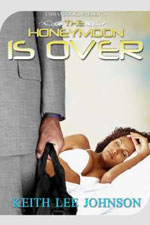



Links
Publicists:
Cory Buford
Heather Buford
Web Design:
Heather Buford
Web Development:
Cory Buford
GateWay
Marketing Online
© 1997-2025 GateWay Marketing Online. All Rights Reserved.
No text or graphics may be copied from this web site without the written permission of its owner.
